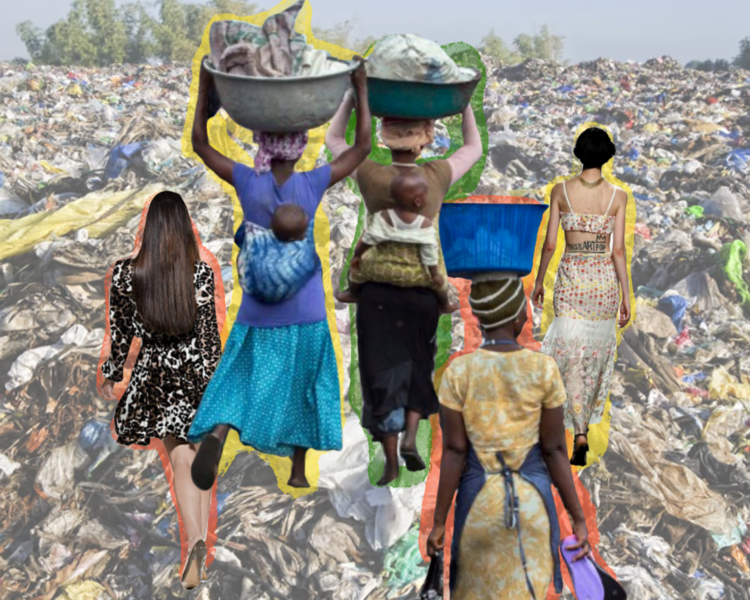Fast Fashion Waste is Overwhelming Ghana
Located within the Gulf of Guinea, along the coast of West Africa, lies the small country of Ghana. While known for its lush beaches, dense forests, and deep history, an environmental crisis is rapidly brewing in the capital city of Accra, threatening both the populace and the world.
The culprit? Fast fashion.
Take a walk through the streets of downtown Accra, Ghana, and you will inevitably find yourself in the city’s famous Kantamanto Market, where the product of choice is clothing. It overwhelms every stall, pouring out into the streets, coating neighborhoods in cotton and spandex - obroni wawu, or dead white man’s clothing.
Familiar labels might draw your attention such as Zara or Target; however, most of what you see has only been worn by their original owners an average of 7 times.
Roughly 15 million articles of used clothing arrive at Ghana’s Kantamanto Market every single week. Most of these shipments come from the unsold leftovers of thrift stores and charities around the world. To put that number into perspective, the population of Ghana is only 30 million people.
Globally, many consumers opt to donate their used clothing items to charitable organizations, like Goodwill or local thrift stores or consignment shops like Plato’s Closet. While this action is backed by good intentions for most, the reality is not so admirable. Many donations end up as shipments to Accra.
Upon arrival, clothing items are bought and sold on the market to generate a profit. According to local authorities, it is contested that the industry has created 2.5 million jobs; however, it is worth noting that this statistic is difficult to verify.
In the early ages of this niche trade, buyers would purchase shipments and receive items in fair condition that sold well on the market. What resulted was a modest but sustainable income. However, despite an increase in production in recent years, fast fashion products have significantly decreased in terms of quality. As a result, the clothing that buyers in Ghana receive has become increasingly difficult to sell.
Of the dozens of clothing shipments that arrive in Accra every week, nothing about the nature of their contents is made known to buyers before their arrival. If clothing items are ripped, stained, or otherwise damaged, as most used clothing items now are, they are deemed useless, unsellable, and sent right to the landfill.
According to ABC’s Foreign Correspondent, “6 million garments leave Kantamanto Market every week as waste.”
A country as small in geographic size as Ghana is not equipped to handle such an output of waste, especially when they receive little to no support from the countries causing the issue.
Ghana’s landfills are overwhelmed. Attempts to minimize the issue have been largely unsuccessful. In one such instance, a landfill caught on fire due to the entrapment of methane gases in such a tight perimeter. That fire burned for 11 months, polluting the atmosphere and the immediate area in the process.
The consequences of the crisis in Ghana are not limited to the country itself. This extends into our atmosphere and oceans, affecting everyone.
The use of synthetic materials, such as spandex, polyester, and nylon is on the rise in fast fashion brands; however, these textiles are not eco-friendly and can take upwards of 200 years to decompose, releasing harmful methane emissions in the process. According to BBC, discarded fashion accounts for 10% of greenhouse gas emissions.
It’s not just the atmosphere that is being polluted either. The clothing that can’t make it to landfills either spills out into neighborhood streets or crowds on coastlines in the form of mountains.
Clothing waste that piles up on Ghana’s beaches washes out into the ocean, creating “tentacles," or long strips of fabric that sink to the ocean floor. These strips disrupt marine ecosystems and pose imminent threats to the health of marine organisms.
No matter their location, views such as the one above have become a familiar sight for families in Ghana and will be for generations to come. People’s homes and livelihoods are being turned into dumping grounds at the hands of fast fashion. Ghana is quickly becoming a breeding ground for injustice, pollution, disease, and all the ingredients that contribute to a poor standard of living. The consequences of which will not just be felt by those living in these fabric-stained streets, but also throughout the world in the form of greenhouse gases and the very real threat of climate change.
The consumption of fast fashion comes at the environmental and social expense of communities like Accra. Being an ethical consumer means considering places like Ghana when making buying decisions.
Image Courtesy: Strike FSU
Remember, just because it’s thrown away doesn’t mean it’s gone forever.
Strike out,
Writer: Sophia Upshaw
Editors: Faveanny Leyva & Lexi Fernandez
Graphics: Katie Boucher
Tallahassee





